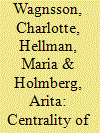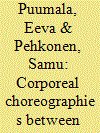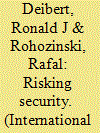|
|
|
Sort Order |
|
|
|
Items / Page
|
|
|
|
|
|
|
| Srl | Item |
| 1 |
ID:
095499


|
|
|
|
|
| Publication |
2010.
|
| Summary/Abstract |
The globalized security situation characterized by transnational threats and international interventionism in "new wars," connect non traditional local actors and traditional global actors to one another in unprecedented ways. We argue that children in particular need to be highlighted because they are highly pertinent to the globalized security situation, yet they make up one of the few agents that have remained non-politicized in the eyes of the scholarly community. The article suggests a framework of analysis that can generate analyses on security of traditional as well as non-traditional agents. Placing non-traditional groups in the center of attention serves to mirror the complexities of the current security situation better.
|
|
|
|
|
|
|
|
|
|
|
|
|
|
|
|
| 2 |
ID:
095502


|
|
|
|
|
| Publication |
2010.
|
| Summary/Abstract |
Corporeal choreography can capture the kind of political agency needed for a transformative politics to emerge. Interviews with failed asylum seekers exemplify negotiations and articulations of agency through movements in a bodyspace we call the interzone. In the explorations of the ways and implications of failed asylum seekers moving between body politics and the political bodyspace Jean-Luc Nancy's ideas of the ontological body, politics and the political are utilized. We suggest that by paying attention to bodies and their movement in living everyday life as failed asylees the spatial gaps and openings can be scrutinized and the functioning of asylum politics as usual disrupted.
|
|
|
|
|
|
|
|
|
|
|
|
|
|
|
|
| 3 |
ID:
095503


|
|
|
|
|
| Publication |
2010.
|
| Summary/Abstract |
In cities today, the possibility of being confined is not only applicable to fixed areas, like work or home, but it may also occur while moving. This is because high levels of mobility, long distances, and extended hours of daily travel, along with monotonous and difficult mobility experiences may lead some to "miss" the city, in a tunnel-like manner. In the context of urban daily mobility practices, this paper argues that although the possibility for expanding places by daily mobility exists, increasingly urban experiences in cities like Santiago de Chile, involve a simultaneous tunneling or confining effect, reducing the possibilities of encounter and interaction, which are the essence of urban experience. Using an ethnographic approach to urban daily mobility practices in Santiago de Chile, this paper discusses how mobility relates to place making and to urban inequality and then analyzes the way place enlargement and confinement occur.
|
|
|
|
|
|
|
|
|
|
|
|
|
|
|
|
| 4 |
ID:
095500


|
|
|
|
|
| Publication |
2010.
|
| Summary/Abstract |
Conceptualizations of cyberspace security can be divided into two related dimensions, articulated as "risks": risks to the physical realm of computer and communication technologies (risks to cyberspace); and risks that arise from cyberspace and are facilitated or generated by its technologies, but do not directly target the infrastructures per se (risks through cyberspace). There is robust international consensus, growing communities of practice, and an emerging normative regime around risks to cyberspace. This is less the case when it comes to risks through cyberspace. While states do collaborate around some policy areas, cooperation declines as the object of risk becomes politically contestable and where national interests vary widely. These include the nature of political opposition and the right to dissent or protest, minority rights and independence movements, religious belief, cultural values, or historical claims. The contrast between the domains has led to contradictory tendencies and paradoxical outcomes.
|
|
|
|
|
|
|
|
|
|
|
|
|
|
|
|
| 5 |
ID:
095501


|
|
|
|
|
| Publication |
2010.
|
| Summary/Abstract |
Giorgio Agamben refers to a basic problem in the constitution of the modern nation state: the state as a nation implies that "bare life" becomes the foundation of sovereignty. With the loss of their citizenship, refugees lose not only all their rights, but more fundamentally the "right to have rights" (Arendt). This dilemma of modern statehood does not vanish under conditions of European integration; it is rather re-scaled. Applying a state-theoretical approach to the European border regime, we will concentrate on the two main techniques by which the EU produces "bare life": the "camp" and the invisible "police state." It will become apparent that the institutionalization of "the right of every human being to belong to mankind" is still lacking. Yet, in contrast to Agamben, we do not trace this constellation back to the collapse of the concept of human rights, but to hegemonies and power relations.
|
|
|
|
|
|
|
|
|
|
|
|
|
|
|
|
|
|
|
|
|